You are viewing the Cultures of Knowledge Blog archive for the ‘Project Updates’ Category:
Update: Preview some preliminary results
We are fortunate to have with us this week Scott Weingart, a former student of Robert A. Hatch and an up-and-coming visualization expert from Indiana University‘s Cyberinfrastructure for Network Science Center. Following on from a workshop at Mapping the Republic of Letters (Stanford) and a three-month stint at CKCC (Huygens Institute), Scott will be spending time with our union catalogue development team at BDLSS, raising awareness of the various techniques and technologies available for representing and visualizing large epistolary datasets. Scott kicked off his stay with a well-attended presentation on ‘Analyzing, Visualizing, and Navigating the Republic of Letters’ on Monday 11 July. In a two-part discussion, Scott provided a general introduction to the many uses and histories of visualizations, before describing in detail the various software packages and data formats necessary for implementation. Both of Scott’s talks can be watched again below; you can also ‘click along’ with his slides.
Part I: Introduction
Part II: Implementation
James Brown
July 13, 2011
Conferences and Workshops, Events, Project Updates
Tags: Databases, Digitization, Europe, Geography, Global, Networks, Spatial Theory, Visualization
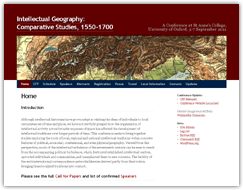
We are pleased to announce that booking is now open for Intellectual Geography: Comparative Studies, 1550-1700, the second Project conference, which will take place at St Anne’s College, Oxford, on 5-7 September 2010. Organised by Howard Hotson, the event brings together case studies and digital projects exploring the roots of local, regional, and national intellectual traditions and networks within concrete features of political, economic, confessional, and physical geography. For provisional programme information, a steadily growing lists of speaker profiles and abstracts, and to book online, please visit the conference website. The deadline for registrations is Wednesay 31 August.
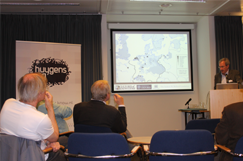
Project Director Howard Hotson opens our talk with some Hartlibian background.
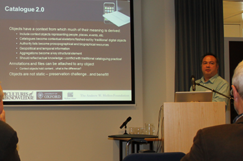
Our technical lead Neil Jefferies describes 'Catalogue 2.0'.
Last week provided us with another opportunity to share the Project, specifically its union catalogue and associated editorial tools, at the international conference Representing the Republic of Letters (The Hague, 30 June–1 July 2011). Organised by our partners and good friends CKCC in the congenial surroundings of the recently renamed Huygens ING, and held in conjunction with the Descartes Centre at Utrecht University, the event showcased the fascinating work being undertaken by various individuals and projects worldwide to represent early modern correspondence networks and their constituent components digitally and visually. General sessions devoted to funding and standards facilitated ongoing collaborative discussions between CofK, our hosts, and Mapping the Republic of Letters (Stanford), who also presented at the event.
 Podcasts of most of the papers in our 2010 and 2011 seminar series, ‘Cultures of Knowledge in Early Modern Europe’, are now available for playing and download on the Project website. The international cast is glittering and the range of correspondence-related topics broad, so please do fire up your speakers and mobile devices. To hear last year’s papers, see the 2010 seminar page; to hear this year’s papers, see the 2011 seminar page. Happy listening!
Podcasts of most of the papers in our 2010 and 2011 seminar series, ‘Cultures of Knowledge in Early Modern Europe’, are now available for playing and download on the Project website. The international cast is glittering and the range of correspondence-related topics broad, so please do fire up your speakers and mobile devices. To hear last year’s papers, see the 2010 seminar page; to hear this year’s papers, see the 2011 seminar page. Happy listening!
James Brown
July 04, 2011
Events, Lectures, Project Updates
Tags: Astronomy, Europe, History of Science, John Wallis, Mathematics, Networks, Oxford, Royal Society, Seventeenth Century
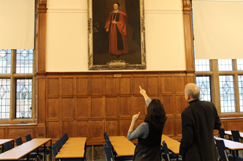
Kneller's 1699 portrait of Wallis in situ.
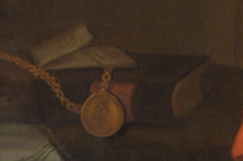
A telling epistolary detail.
In the eighth and final paper of our second seminar series on Thursday 23 June, our very own Dr Philip Beeley (University of Oxford) brought proceedings to a strong finish with a paper entitled ‘Oxford Science and the Republic of Letters: The Correspondence Networks of John Wallis’. Drawing on his intensive research on Wallis’s letters – two hard-copy editions of which he is preparing for publication with the support of the Project – Beeley argued that, in the absence of direct patronage, Wallis’s 246 individual correspondences enabled the mathematician, cryptographer, and (from 1649) Savilian Professor of Geometry to establish a name for himself within the broader European Republic of Letters. Indeed, the importance of epistolarity to Wallis is iconographically symbolised by the prominence of an opened letter in Kneller’s 1699 portrait of him (pictured), which now hangs in the University’s Examination Schools. Focussing on case studies, Philip used Wallis’s harmonious communications with the Danzig astronomer Johannes Hevelius to show how epistolary exchanges between distant friends could facilitate the kind of productive intellectual commerce and collaboration idealized by Comenius, Hartlib, and (in the context of the early Royal Society) Henry Oldenburg. However, switching his focus to Wallis’s more turbulent astronomical entanglements with the Dutch mathematicians Christiaan Huygens and Frans van Schooten, Beeley reminded us that the Republic of Letters was far from a gentleman’s club, and that interpersonal rivalries, methodological disuputes, accusations of plagiarism, and the quest for success and status remained powerful influences on scientific discussion throughout the second half of the seventeenth century. Questions focused on letters, mathematical pedagogy, and disciplinary formation; the importance of the patronage of Mary Vere during the first part of Wallis’s career; and unwritten codes of conduct and behaviour within the Republic of Letters. For past lectures in the series, please see the seminar webpage; details of the 2011 series will be available shortly.
 Podcast now available on the seminar page!
Podcast now available on the seminar page!
James Brown
June 26, 2011
Events, Lectures, Project Updates
Tags: Databases, Eighteenth Century, Hans Sloane, History of Medicine, History of Science, Networks, Seventeenth Century, Visualization
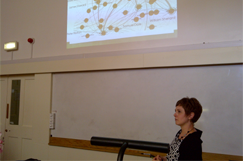
Dr Smith during her talk.
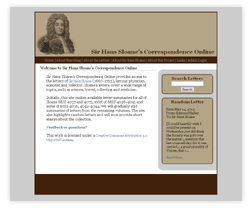
For the seventh and penultimate paper of our seminar series on Thursday 16 June, Dr Lisa Smith (University of Saskatchewan) described her recent efforts towards ‘Visualizing Hans Sloane’s Early Correspondence Networks’. Despite neglect in the historiographies of medicine and science, Smith described Sloane as a facilitator or ‘supermediator’ central to the activities of the early Royal Society as well as the lives of his patients, who corresponded voluminously despite his small number of formal publications. Indeed, Smith is in the process constructing a relational database of Sloane’s many letters – Sir Hans Sloane’s Correspondence Online – which she demonstrated during the talk, and which provided the raw data for the network visualizations. Emphasising that the resource is a work in progress (although an impressive 1,641 letters have been catalogued so far), Smith described the ‘back’ and ‘front’ ends of the catalogue – like our own digital resource, a sophisticated editorial interface sits beneath the search and browse functions – which allows users to explore and filter the Sloane corpus by a full range of standard epistolary metadata as well as a variety of medical themes and keywords, both contemporary and modern. Transcriptions are also being made available, while digital images of the original manuscripts are also in the pipeline. In the second half of her talk, Smith used visualizations of the data created with the recent Yifan Fu algorithm to explore several of the most interesting networks revealed by the correspondence; a surprisingly continental set of relationships, in which connections of patronage, marriage, and friendship loom large. Smith concluded by arguing that network visualizations derived from large datasets are vital in revealing intricacies and overlaps between groups of individuals which would not otherwise have been perceivable, and are of special value in highlighting clusters of relationships (or networks within networks) which can then be reconstructed in more detail. Seminars take place in the Faculty of History on George Street on Thursdays at 3pm. For future talks in the series, please see the seminar webpage.
 Podcast now available on the seminar page!
Podcast now available on the seminar page!




 Podcasts of most of the papers in our 2010 and 2011 seminar series, ‘Cultures of Knowledge in Early Modern Europe’, are now available for playing and download on the Project website. The international cast is glittering and the range of correspondence-related topics broad, so please do fire up your speakers and mobile devices. To hear last year’s papers, see the
Podcasts of most of the papers in our 2010 and 2011 seminar series, ‘Cultures of Knowledge in Early Modern Europe’, are now available for playing and download on the Project website. The international cast is glittering and the range of correspondence-related topics broad, so please do fire up your speakers and mobile devices. To hear last year’s papers, see the 




 Join
Join 